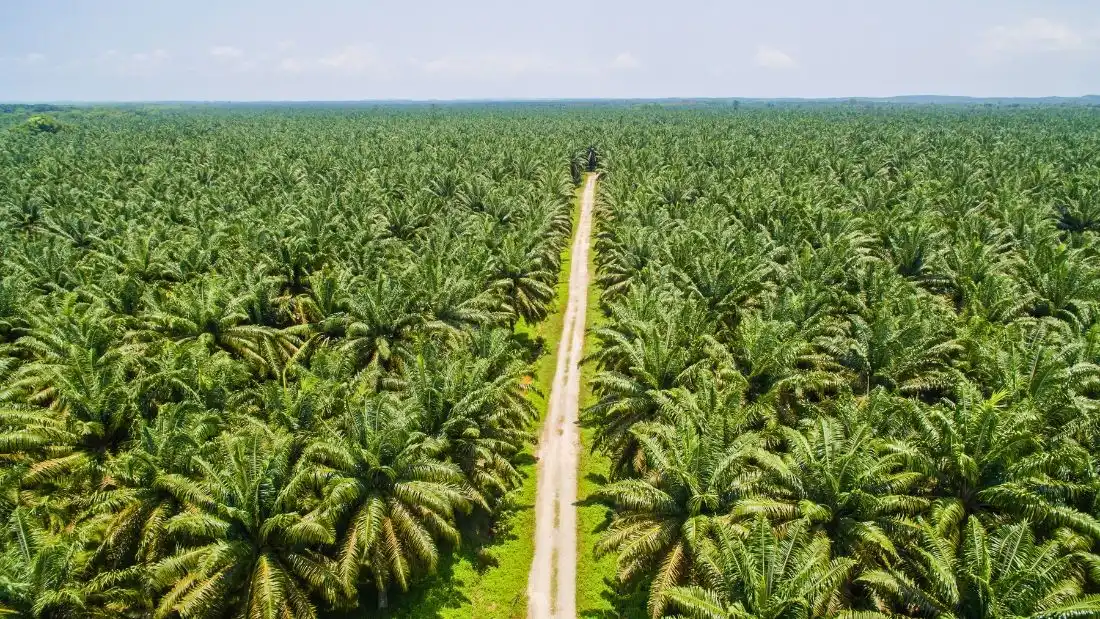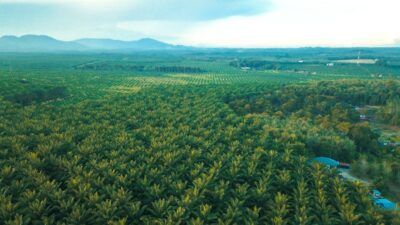Palm Oil – The Good, the Bad, and the Ugly

Walk into any supermarket and you’ll find palm oil in nearly half of all packaged products – from chocolate and shampoo to instant noodles and lipstick. And its uses don’t end there! Palm oil and its derivatives are used in the production of synthetic fibres, waterproofing fabrics and, in some parts of the world, as animal feed and biofuel. Its versatility and efficiency have made it the most widely used vegetable oil in the world.
But behind its economic success lies a complex web of concerns about environmental destruction and ethical and corporate greenwashing. So, is palm oil truly as bad as its reputation suggests or is there another side to the story? Or maybe there’s a better alternative anyway.
The good
Palm oil is often demonised but it’s not all doom and gloom. As the most productive vegetable oil crop, it requires significantly less land than alternatives such as coconut, sunflower or rapeseed oil. Palm oil supplies 40 per cent of the world’s vegetable oil demand on just six per cent of the land used to produce all vegetable oils globally, meaning we would need four to 10 times more land to meet demand if we got rid of palm oil.
Economically, palm oil is a lifeline for millions of people. Its production helps support the economies of producing countries as well as providing a living for some seven million smallholders globally. Four million jobs in Indonesia and nearly a million in Malaysia come directly from palm oil production, many in remote rural areas where work is hard to find.
While much of the large-scale production is concentrated in Indonesia, Malaysia and Thailand, small-scale and independent farming continues across other countries in Southeast Asia, West Africa and Central and South America. Unlike industries with high entry barriers, palm oil cultivation offers opportunities for small-scale farmers to participate in global trade.
Palm oil is incredibly versatile – it’s used in food production, cosmetics, cleaning products and even biofuels. Nutritionally, it is rich in vitamin E and antioxidants, and given its high yield, long shelf life and ability to withstand high temperatures, it is nearly irreplaceable in some applications.
Efforts are being made to make palm oil more sustainable, with the Roundtable on Sustainable Palm Oil (RSPO) certifying oil that meets environmental and ethical standards, while some companies are investing in deforestation-free supply chains. In 2012, the UK Government recognised that we were part of the palm oil problem and committed to using palm oil that is 100 per cent from sustainable sources and that doesn’t harm nature or people. By 2019, 70 per cent of total palm oil imports met these requirements.
The bad
Palm oil production has significant downsides, particularly its impact on the environment. The most glaring issue is deforestation. Vast swaths of rainforest are cleared to make way for plantations, primarily in Indonesia and Malaysia, and most of us have probably seen the devastating photos showing bewildered and homeless orangutans. This destruction threatens biodiversity, pushing endangered species like orangutans, Sumatran tigers and pygmy elephants closer to extinction.
The burning of forests to clear land releases enormous amounts of carbon dioxide, contributing to climate change. Between 2001 and 2019, 38,000 square miles of Indonesian forests were destroyed to make way for oil palms. On the island of Borneo, palm oil was responsible for almost 40 per cent of deforestation between 2000 and 2018. On a global scale, palm oil makes a sizeable contribution to climate change from the draining and conversion of tropical peat forests and forest fires. The destruction of tropical peat forests in Indonesia is particularly damaging because these forests store more carbon per hectare than any other ecosystem in the world.
Ethical concerns also plague the industry. Reports of child labour, forced labour and exploitative working conditions are widespread. Many palm oil plantations operate in areas where indigenous communities live, leading to land disputes and displacement. While some companies claim to adhere to ethical standards, enforcement remains weak and transparency is often lacking.
The ugly
Greenwashing is a big issue in the palm oil industry, with companies marketing their products as ‘sustainable’ or ‘deforestation-free’ without substantial proof. Some corporations claim RSPO certification while still engaging in harmful practices, taking advantage of loopholes in the certification process. A 2018 report found that in Indonesia, RSPO-certified plantations were responsible for more tree loss than non-certified ones.
Political interests also play a major role in the palm oil industry. Governments in producing countries often prioritise economic growth over environmental protection. Lobbying efforts by major corporations delay stricter regulations while corruption within regulatory bodies allows unsustainable practices to continue unchecked. Consumers trying to make ethical choices often struggle with misleading labels and limited transparency.
Are there better alternatives?
The short answer to whether there are better alternatives is probably not. If palm oil were banned, there would be large increases in the production of less sustainable alternatives, which could lead to even more deforestation and environmental damage. Such a change would effectively move palm oil’s many problems to other parts of the world, threatening other habitats, species and communities.
Some companies are investing in synthetic and lab-grown oils, with advances in biotechnology leading to the development of yeast- and algae-based oils that mimic the properties of palm oil. While promising, these alternatives are not yet scalable or affordable for mass production.
Currently, the best approach seems to be not to eliminate palm oil but to improve its sustainability. Consumers can look for RSPO-certified products and push for stronger environmental policies. At the same time, corporations and governments must commit to ethical sourcing, stricter enforcement of regulations and greater transparency in supply chains.
The way forward
Deciding where you stand on these issues can feel like an impossible task – you cannot ignore the many environmental and ethical issues yet there appear to be no viable alternatives.
Perhaps there is a more fundamental question altogether: in our search for alternatives to palm oil, are we overlooking a broader issue – our society’s habit of overconsumption? Maybe the solution isn’t simply replacing palm oil with another ingredient but rethinking our demand altogether. While I don’t claim to have all the answers to this complex challenge, I believe the palm oil debate offers a powerful opportunity for self-reflection and a more conscious approach to how we live and consume.







